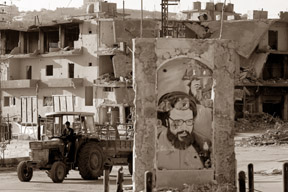|
observer |
|
|
|
|
|
OTHER LINKS |

|

|

|
|
Sri Lankans: Forgotten people in bleeding LebanonExpatriates trapped in Lebanon as a result of the ongoing war between Israel and Hezbollah are many and from different third world nationalities. But what is certain is that the vast majority of them are Sri Lankans, who form the country's second largest expatriate community after the Palestinian refugees.
Unlike the US, Britain, France, Canada, and Australia, all of which hastened to evacuate their nationals from Lebanon in the first week of Israel's military assault, Sri Lanka left its citizens there to their fate, without providing any humanitarian assistance. It did not even appeal to the Israelis to spare them, contrary to other Asian countries such as the Philippines, which has nearly 30,000 workers in Lebanon. This, of course, differed from what happened during the 1990/1991 Gulf war when a mass-scale UN-sponsored evacuation of expatriates from Iraq and occupied Kuwait was arranged with assurance of compensation. When India, the only country that volunteered to evacuate non-white skinned people from Lebanon to Cyprus, offered to include Sri Lankan nationals in its evacuation plan of nearly 12,000 Indians working in the country, the number of Sri Lankan workers who could reach the port of evacuation was less than 300. Worse than that was a statement by Sri Lankan Labour Relations Minister Athauda Senevirathne, in which he urged his trapped people in Lebanon to stay there, adding that "they are used to conflict" and hence could get along with any volatile situation. He told a press conference that his government did not want them to return home and that families should stop urging their loved ones to do so. Sharp criticismThis position by Colombo has generated sharp criticism. Sri Lankan dailies have accused the government of being more concerned about remittances than the safety of its citizens. Foreign remittances, which last year reached an unprecedented figure of $1.5 billion, have been the country's second largest source of foreign exchange. With such criticism growing and the Israeli bombardment of Lebanon widening, Colombo sent two aircraft to Damascus to evacuate its citizens. However, neither this nor assistance provided by Qatar in the form of arranging ten flights for the purpose, could rescue more than 2,000 people. Given Lebanon's devastated road network and continuous Israeli aerial bombardment, the number of those who could travel to Damascus was very limited. Besides, the great majority of Sri Lankan workers were left without any money to pay for transportation to Syria, their travel documents have either been lost or confiscated by their Lebanese employers. Considerable percentage of Lankan migrantsTo imagine the situation better, a considerable percentage of Lebanon's Lankan migrants work in the country's southern region where fighting and destruction have been the worst. Many of them were prevented by their employers from leaving or were left locked up to look after properties after their employers escaped. Crushed to death For Lebanon's Lankan migrants, the tragedy seems to be more painful. They escaped poverty and instability at home to find themselves not only stranded in dangerous areas but also lost their savings, belongings and months of unpaid wages. According to those who managed to return, several Sri Lankan domestic helpers were crushed to death in air strikes and their bodies were left unburied. Studies conducted on Sri Lankan migrant workers indicate that their experience in Lebanon has generally not been encouraging. More than 30 per cent of them have suffered different forms of abuse and humiliation. Like in other Middle Eastern countries, which have been recruiting Sri Lankan housemaids since the 1970s, they encountered problems involving mistreatment, beatings, threats, sexual harassment, withholding of wages, long hours of work and miserable accommodation. A rare documentary film released in 2005 brilliantly focused on the issue. The film, funded by Caritas Migrant Centre Lebanon and the International Labour Organisation and shot by Lebanese director Carol Mansour, was shown in many institutions to create awareness about problems faced by migrant workers. This was a significant development as problems of Lankan migrant workers in Lebanon have long been ignored even by the Colombo government. It was said that Sri Lankan officials have always avoided discussing the issue with their Lebanese counterparts, fearing Lebanon might search for other sources of domestic helpers. The initial change took place in 2000 following a visit to Beirut by the well-known Sri Lankan actor Ranjan Ramanayka, in which he drew the media's attention to the intense abuse and maltreatment of many domestic workers in Lebanese homes and prisons. As a result, their plight began to receive official and non-official attention, but without any significant change in their situation. Dr Abdullah Al Madani is an academic researcher and lecturer on Asian affairs. |
 According to official estimates, Lebanon hosts some 92,000 Sri
Lankans, 86,000 of whom are female domestic helpers. Forming a
considerable segment of the Sri Lankan migrant labour force in the
Middle East, which is currently estimated at 1.5 million, they have been
arriving in Lebanon since the 1980s in waves of about 10,000 a year.
According to official estimates, Lebanon hosts some 92,000 Sri
Lankans, 86,000 of whom are female domestic helpers. Forming a
considerable segment of the Sri Lankan migrant labour force in the
Middle East, which is currently estimated at 1.5 million, they have been
arriving in Lebanon since the 1980s in waves of about 10,000 a year. 







